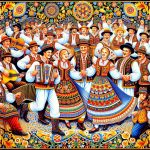
Poland has a rich tradition of literature, with authors who have not only shaped the country’s identity but also made significant contributions to literature worldwide. Adam Mickiewicz, for example, is a celebrated poet whose work captures the essence of Poland.
Then there’s Wisława Szymborska, a Nobel Prize-winning poet known for her insightful poems. Science fiction fans might be familiar with Stanisław Lem, whose imaginative stories have earned him global recognition.
Henryk Sienkiewicz, who brought historical novels to life, and Zbigniew Herbert, known for his modern poetry, have also made their mark. Each of these writers has brought something special to the world of literature, influencing readers and writers far beyond Poland’s borders.
Let’s take a closer look at their contributions and how they continue to impact literature today.
Adam Mickiewicz: National Bard
Adam Mickiewicz stands out as Poland’s national poet. He played a critical role in shaping Polish literature by bringing a deep sense of patriotism and masterful language to his work. His poetry, especially the epic ‘Pan Tadeusz’, is a cornerstone of Polish literature, blending nostalgia for his early years in the Lithuanian-Belarusian regions with a hopeful vision of a united Poland. Mickiewicz was not just a poet; he was a visionary who used the Polish language in innovative ways, exploring themes of freedom and identity that resonated deeply with the Polish people. His work sparked political and social awareness, making him a key figure in the Polish Romantic movement.
Let’s break this down a bit. Mickiewicz’s work is more than just poetry; it’s a rallying cry for Polish independence, filled with stories and characters that embody the nation’s spirit and aspirations. For example, ‘Pan Tadeusz’ isn’t just a poem; it’s an immersive tale of life in Poland and Lithuania before they became part of the Russian Empire, offering readers a glimpse into the past and a hope for the future. This merging of personal memory with national history makes Mickiewicz’s work profoundly impactful.
Moreover, Mickiewicz’s use of the Polish language was revolutionary. He expanded its possibilities, making it a powerful tool for expressing complex ideas and emotions. His ability to weave together personal and national themes made his work universally appealing, encouraging Poles to think about their identity and aspirations.
In a more conversational sense, think of Mickiewicz as the person who reminded Poles of what they were fighting for during times of political turmoil. Through his words, he painted a picture of a Poland that was free, united, and proud of its heritage. His legacy is not just in his poetry but in the inspiration it continues to provide, reminding us of the power of language to ignite change and foster a sense of community.
Wisława Szymborska: Poetic Genius
Adam Mickiewicz might have started the journey of Polish literature, but Wisława Szymborska took it to new heights. She had a unique way of looking at the world, combining a questioning mind with a sense of awe. This mix allowed her to write about life, war, and love in a way that was both deep and witty. Szymborska had a talent for making big, complicated ideas feel simple and touching through her poetry.
Her skill in using words and crafting poems made her stand out, not just in Poland but around the world. When she won the Nobel Prize in Literature in 1996, it wasn’t just a win for her. It was a recognition of her major impact on literature. Szymborska’s work shows us how to look at the ordinary and find the extraordinary.
For example, in one of her famous poems, she talks about the joy of writing and the power of imagination. This poem, like much of her work, invites readers to see the world differently and find wonder in everyday life.
If you’re new to Szymborska’s poetry and not sure where to start, I recommend picking up her collection ‘View with a Grain of Sand.’ It’s a fantastic introduction to her work, showcasing the range of themes she explored and her unique voice. Reading Szymborska is like having a conversation with a wise friend who can find the beauty in the mundane and the profound in the simple. Her poetry has a way of sticking with you, making you think and feel long after you’ve turned the page.
Stanisław Lem: Sci-Fi Visionary
After discussing the poetry of Wisława Szymborska, let’s dive into Stanisław Lem’s world. Lem was a brilliant science fiction writer from Poland who changed how we think about the future. He mixed big ideas about life and technology in stories that were not just about space or aliens but asked big questions about what it means to be human.
One of his most famous books is ‘Solaris.’ It’s a story that mixes science with deep thoughts about the mind and reality. Imagine a planet covered by a vast ocean that can read the deepest parts of an astronaut’s mind and turn those thoughts into reality. It’s a book that makes you question what you know about consciousness and the universe.
Lem was good at making complicated science ideas easy to understand and exciting. He thought about things like artificial intelligence and virtual reality long before they were common topics. His writing makes us think about the ethics of technology and our place in the universe.
His stories are more than just science fiction. They are a blend of philosophy, science, and psychology. Lem had a unique way of looking at the future, making readers think deeply about where humanity is heading.
Lem’s influence goes beyond Poland; he’s a key figure in science fiction worldwide. His ability to combine complex ideas with engaging stories has left a mark on literature and inspired many to think differently about the future.
Henryk Sienkiewicz: Historical Novelist
Henryk Sienkiewicz was a renowned author in the world of historical fiction. He had a unique talent for drawing readers into the past with stories that combined Poland’s history with timeless themes like courage, struggle, and perseverance. Sienkiewicz’s novels went beyond mere storytelling. They engaged with the social and political issues of his day, reflecting on what it means to be Polish and how history shapes collective memory.
His most famous work, ‘Quo Vadis,’ is set in the ancient Roman Empire. It’s a prime example of how he mixed historical detail with engaging narratives. This novel was so well-received that it earned him the Nobel Prize in Literature in 1905. Through his writing, which was both broad in scope and deeply humanistic, Sienkiewicz became a key figure in Polish literature and a source of national pride.
In ‘Quo Vadis,’ for instance, Sienkiewicz didn’t just tell a story set in the past. He brought ancient Rome to life, filling it with characters that felt real and relatable. His depiction of the early Christians’ plight under Emperor Nero offered insights into the human capacity for faith and resilience in the face of tyranny. This approach made history accessible and engaging, showing readers the relevance of the past to their own lives.
Sienkiewicz’s ability to weave complex historical events with human stories set him apart. His works serve as a bridge between the past and the present, reminding us that while times change, the fundamental aspects of the human experience remain constant. For those interested in exploring historical fiction that combines depth, drama, and historical rigor, reading Sienkiewicz’s novels would be an excellent start. Through his storytelling, we not only learn about historical events and figures but are also invited to reflect on our own values and resilience.
Zbigniew Herbert: Modern Poet
Zbigniew Herbert stands out as a key figure in modern Polish poetry, skillfully combining traditional themes with issues of the present day. His poetry dives deep into questions about human nature, ethics, and the impact of European culture, all while being keenly aware of the complex social and political environment of 20th-century Poland. However, Herbert’s insights are not limited by time or place; they speak to universal experiences of perseverance, ethical challenges, and the search for truth.
Herbert had a unique way of expressing these themes, often using irony and metaphor to deepen his exploration. For example, in his poem ‘Mr. Cogito’s Guide to the Perplexed,’ he presents a fictional character, Mr. Cogito, who reflects on personal and philosophical dilemmas, making abstract concepts more accessible and relatable. This approach not only made his work resonate with a broad audience but also showcased his ability to innovate within the poetic form.
Moreover, Herbert’s focus on the craft of language was remarkable. He paid close attention to every word and structure, ensuring that his poetry was both meaningful and beautifully composed. This meticulousness in language and style helped cement Herbert’s position as a transformative figure in literature.
In discussing Herbert’s impact, it’s important to note how his work encourages readers to think critically about the world around them. Through his blend of historical context and timeless themes, Herbert invites us to consider our own values and the legacy of our culture. For those interested in exploring Herbert’s work further, collections such as ‘Report from the Besieged City and Other Poems’ offer a comprehensive look at his masterful blend of the personal and the universal.
In a nutshell, Zbigniew Herbert’s poetry stands as a testament to his profound understanding of the human experience. His ability to weave together the personal with the universal, the historical with the contemporary, makes his work an enduring source of insight and inspiration.
Conclusion
Poland has a rich literary scene that reflects its complicated history and cultural identity. Famous Polish writers like Adam Mickiewicz, Wisława Szymborska, Stanisław Lem, Henryk Sienkiewicz, and Zbigniew Herbert have all made significant contributions to this field.
Each of these authors brings something unique to the table. They explore themes like what it means to be human, express national pride, and dive into the world of science fiction. Together, their works are at the heart of Polish literature and have gained international attention, sparking discussions about culture and intellect around the world.






Comments are closed.